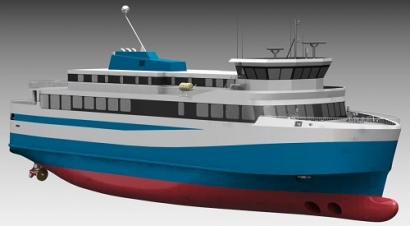
The ferry, with a capacity of 550 passengers and 75 cars, is due for delivery from the Crist S.A. shipyard in 2019. Conceptual design of the ferry was completed by Polarkonsult, and StoGda Ship Design & Engineering was responsible for the class design and production documentation of the vessel.
The vessel will be powered by a 3000kWh battery and is designed to operate in a fully electric mode for most of time, with onshore charging in both harbors. During particularly challenging weather conditions, when the consumption of battery power may exceed the available energy, the ferry will utilize its diesel-electric generator set.
The new ferry will replace the 1992-built MF Herjólfur in line with Iceland’s incentives to promote electric modes of transportation. With 80 percent of Iceland’s energy coming from non-fossil resources, led by hydropower and geothermal energy, the new vessel will be well positioned to support Iceland’s sustainability goals.
“Opting for ABB’s electric solutions allows the vessel to meet design constraints that initially seem in conflict: it is optimized for cleaner operation and reduced greenhouse gas emissions, whilst power is sufficient to navigate some very hazardous waters safely,” said Sigurdur Gretarsson, Director of Maritime Division, Icelandic Road and Coastal Administration.
ABB’s power distribution system Onboard DC GridTM will allow the batteries to connect directly to the DC link, which helps avoids losses of power during charging and discharging. Additionally, the system can allow for variable speed operation of the diesel engines, which results in reduced fuel consumption.
The scope of ABB supply also includes generators, transformers, switchboards, the Power and Energy Management System (PEMS) and the Energy Storage Control System (ESCS). The ferry will be connected to ABB Ability™ Collaborative Centers Infrastructure. This network uses remote equipment monitoring and data analytics to enable remote technical support, as well as predictive maintenance and planned interventions.
Crucial to the supporting infrastructure shoreside is the shore power connection delivered by ABB to recharge the battery with a power of 2500kW while the ferry is in the dock. On average, it will take about 30 minutes to recharge.
The new ferry will not only reduce the environmental impact, but also improve the regularity of the connection. Previously, during rough weather, the ferry operating the route would travel to an alternative harbor to dock safely, extending the sailing time from 45 minutes to close to 3 hours and often causing motion sickness in passengers. The new ferry will be able to enter the destination harbor in challenging weather conditions most of the time, with the rare exception of particularly rough seas.

